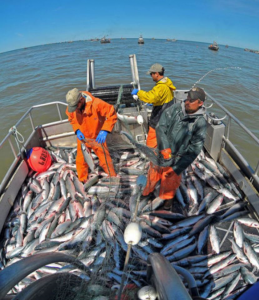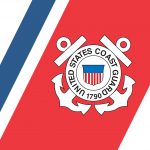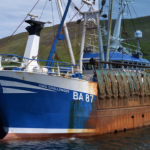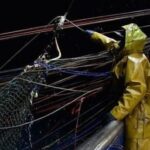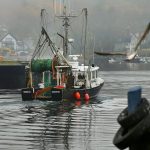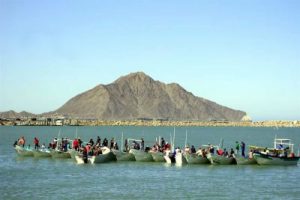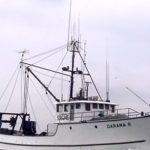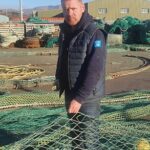Tag Archives: Commercial Fisheries Entry Commission
Alaska Gov. Dunleavy names ad consultant, talk show host Porcaro to commercial fisheries agency
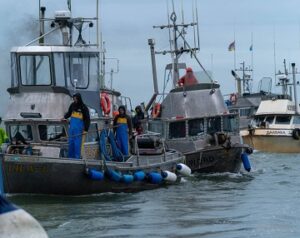 Alaska Republican Gov. Mike Dunleavy has appointed a GOP advertising consultant and talk show host to a highly paid state government job: a position overseeing commercial fishing permits. Dunleavy this month appointed Mike Porcaro as one of two commissioners overseeing the Commercial Fisheries Entry Commission, or CFEC — an obscure, Juneau-based agency with some 20 employees. The commission issues annual commercial fishing permits, grants and denies permit transfers in the event of illnesses and deaths and publishes fisheries reports and statistics. “All I’m doing is trying to answer a call of service, and I’m going to do the best job I can do,” Porcaro said in an interview Thursday. He added: “Judge me on my performance.”>click to read< 11:33
Alaska Republican Gov. Mike Dunleavy has appointed a GOP advertising consultant and talk show host to a highly paid state government job: a position overseeing commercial fishing permits. Dunleavy this month appointed Mike Porcaro as one of two commissioners overseeing the Commercial Fisheries Entry Commission, or CFEC — an obscure, Juneau-based agency with some 20 employees. The commission issues annual commercial fishing permits, grants and denies permit transfers in the event of illnesses and deaths and publishes fisheries reports and statistics. “All I’m doing is trying to answer a call of service, and I’m going to do the best job I can do,” Porcaro said in an interview Thursday. He added: “Judge me on my performance.”>click to read< 11:33
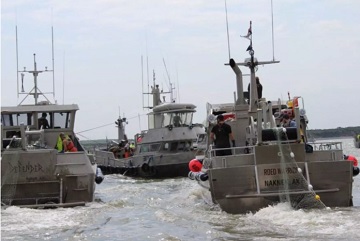
Bristol Bay’s sockeye runs break records, but local permit ownership has declined for decades
This summer, 79 million sockeye returned to Bristol Bay. It was the largest run on record. But over the past half-century, there has been a dramatic shift in who fishes commercially in Bristol Bay. Local permit ownership has declined sharply, and research shows that’s due in part to a regulatory change to Alaska’s fishery management from the 1970s. Propelled by years of low salmon returns and more people coming to the state to fish, Alaskans voted in 1972 to amend the state’s constitution and implement a limited entry system. This system restricted the number of commercial fishing permits in areas around the state, including Bristol Bay. >click to read< 08:14
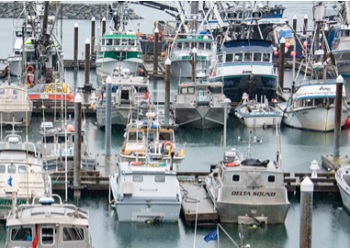
GHL down for Pollock pelagic trawl fishery
A directed fishery for walleye pollock using pelagic trawl gear in the Prince William Sound registration area will open at noon Jan. 20 with a guideline harvest level 2,988 metric tons, down 684 metric tons from last year’s quota. Registration for this fishery will be issued only to individuals who possess a 2019 miscellaneous saltwater finfish permit card for trawl gear. The deadline for registration is 5 p.m. Jan. 13. >click to read< 09:01
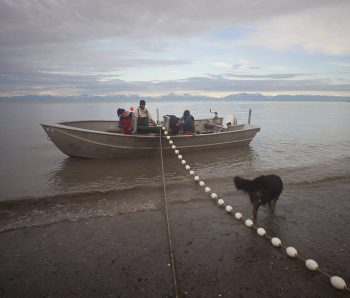
Cook Inlet setnet buyback program gains support
Cook Inlet fishermen are again pushing for a bill that would authorize a commercial set gillnet permit buyback, but with the budget battles ongoing, it may not advance this year. Senate Bill 90 is the latest version of the plan to set up a buyback program for setnet permits on Cook Inlet’s east side. About 440 permits exist on the east side, targeting primarily sockeye salmon with secondary catches of king salmon headed for the Kasilof and Kenai rivers. The bill, sponsored by Sen. Peter Micciche, R-Soldotna, aims to permanently remove up to 200 permits and their shore leases from the fishery. The fishermen have been debating a way to reduce the fleet for about four years,,, >click to read<21:23
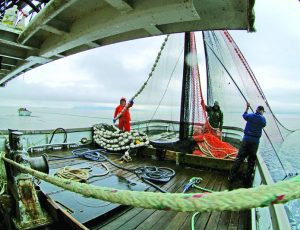
Southeast purse seiners to hold another permit buyback vote
Southeast Alaska purse seine fishermen are preparing to vote on another permit buyback, with an eye toward making the fishery more viable in an era of more efficient vessels and smaller salmon runs. The National Marine Fisheries Service is scheduled to send out ballots to fishermen starting Jan. 15 asking whether the fleet should take on $10.1 million in federal loans to buy out 36 permits, removing them from the fishery forever. If successful, the move would reduce the number of permits in the fishery to 279, down about 100 permits since 2012. >click to read<14:35
Commissioner, 3 employees are leaving embattled Alaska fishing agency
 One of the two leaders of an embattled Alaska commercial fishing agency is leaving his job, he said this week. Ben Brown, a commissioner at the Commercial Fisheries Entry Commission, said in an email that he’s resigning to take a job at a Juneau arts organization. His departure comes within the same month as three other commission employees’, according to a former colleague. Brown and Bruce Twomley, CFEC’s other commissioner, have both earned more than $130,000 a year to supervise the fishing agency even though their most essential work — limiting access to fisheries and ruling on permit applications — has slowed dramatically. click here to read the story 08:58
One of the two leaders of an embattled Alaska commercial fishing agency is leaving his job, he said this week. Ben Brown, a commissioner at the Commercial Fisheries Entry Commission, said in an email that he’s resigning to take a job at a Juneau arts organization. His departure comes within the same month as three other commission employees’, according to a former colleague. Brown and Bruce Twomley, CFEC’s other commissioner, have both earned more than $130,000 a year to supervise the fishing agency even though their most essential work — limiting access to fisheries and ruling on permit applications — has slowed dramatically. click here to read the story 08:58
An Alaska fishing commission has worked itself out of a job. But its commissioners still make more than $130,000 a year
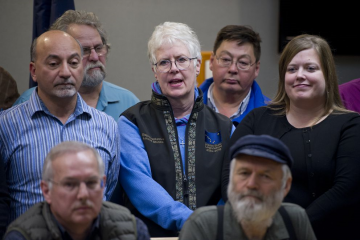 The two political appointees, Ben Brown and Bruce Twomley, are being paid even though they’ve all but stopped doing the Commercial Fisheries Entry Commission’s most essential work: They haven’t limited access to a fishery since 2004, and they’ve resolved no more than three permit applications in each of the past five years, down from the dozens that were once processed annually. The commission was created in the 1970s in an experiment at “limited entry”: capping the number of commercial fishermen in state fisheries as a means of conservation. The commission decided which fisheries to limit, then reviewed applications from fishermen and ruled on who would get to keep fishing and who would lose access — a right that had been enshrined in the Alaska Constitution until voters approved a limited entry amendment. The permits issued to the remaining fisherman essentially gave them exclusive rights to what had been a public resource — fish in the sea. Later, with a push from U.S. Sen. Ted Stevens, the federal government began a similar process in waters outside the state’s 3-mile limit. click here to read the story 08:19
The two political appointees, Ben Brown and Bruce Twomley, are being paid even though they’ve all but stopped doing the Commercial Fisheries Entry Commission’s most essential work: They haven’t limited access to a fishery since 2004, and they’ve resolved no more than three permit applications in each of the past five years, down from the dozens that were once processed annually. The commission was created in the 1970s in an experiment at “limited entry”: capping the number of commercial fishermen in state fisheries as a means of conservation. The commission decided which fisheries to limit, then reviewed applications from fishermen and ruled on who would get to keep fishing and who would lose access — a right that had been enshrined in the Alaska Constitution until voters approved a limited entry amendment. The permits issued to the remaining fisherman essentially gave them exclusive rights to what had been a public resource — fish in the sea. Later, with a push from U.S. Sen. Ted Stevens, the federal government began a similar process in waters outside the state’s 3-mile limit. click here to read the story 08:19
By executive order, Gov. Walker merges Commercial Fisheries Entry Commission with Alaska F&G
 The move, suggested by cost-cutters for several years, is estimated to save the state $1.33 million per year in administrative costs, the governor said by email Tuesday. The two commissioners for the entry commission and legal staff will continue to be an independent agency despite the merger. “With a $3.5 billion budget deficit, we are leaving no stone unturned as we look for efficiencies in state government,” Walker wrote in a statement.,, Read the rest here 16:24
The move, suggested by cost-cutters for several years, is estimated to save the state $1.33 million per year in administrative costs, the governor said by email Tuesday. The two commissioners for the entry commission and legal staff will continue to be an independent agency despite the merger. “With a $3.5 billion budget deficit, we are leaving no stone unturned as we look for efficiencies in state government,” Walker wrote in a statement.,, Read the rest here 16:24
Bill to eliminate CFEC moves out of Fisheries Committee
 According to Rep. Louise Stutes, R-Kodiak, the Commercial Fisheries Entry Commission gets too much money for too little work that is does poorly anyway. Commercial fishing industry representatives oppose the bill almost unanimously, opting instead to let CFEC fix its inefficiencies on its own. During the 2014 legislative session, Rep. Paul Seaton, R-Homer, introduced a similar bill to Stutes’s. Read the rest here 21:22
According to Rep. Louise Stutes, R-Kodiak, the Commercial Fisheries Entry Commission gets too much money for too little work that is does poorly anyway. Commercial fishing industry representatives oppose the bill almost unanimously, opting instead to let CFEC fix its inefficiencies on its own. During the 2014 legislative session, Rep. Paul Seaton, R-Homer, introduced a similar bill to Stutes’s. Read the rest here 21:22
Bill to ax Alaska fish commission passes out of committee
The House Fisheries Committee on Thursday passed a bill that would eliminate the Commercial Fisheries Entry Commission and move its duties to the Alaska Department of Fish and Game . The unanimous vote came despite fishermen’s objections that the bill upends the separation of power between the commission that oversees Alaska’s limited-entry fisheries like salmon and the agency that regulates commercial fishing. Read the rest here 13:02
. The unanimous vote came despite fishermen’s objections that the bill upends the separation of power between the commission that oversees Alaska’s limited-entry fisheries like salmon and the agency that regulates commercial fishing. Read the rest here 13:02
Commercial Fisheries Entry Commission Chief Reacts To Being On Chopping Block
 The Commercial Fisheries Entry Commission is defending itself against a recent state report pointing out inefficiencies and legislation that could dissolve the agency. Since its creation in 1973, Twomley says the commission has been going through a deluge of thousands of applications to limited entry fisheries and is now down to the last 28 cases. The report recommends those be complete by the end of June. A more reasonable time frame, says Twomley, is by the end of 2016. Audio, Read the rest here 08:35
The Commercial Fisheries Entry Commission is defending itself against a recent state report pointing out inefficiencies and legislation that could dissolve the agency. Since its creation in 1973, Twomley says the commission has been going through a deluge of thousands of applications to limited entry fisheries and is now down to the last 28 cases. The report recommends those be complete by the end of June. A more reasonable time frame, says Twomley, is by the end of 2016. Audio, Read the rest here 08:35
‘Worst of all possible times’ to gut fish commission, chair says
 The three-member commission that oversees Alaska’s lucrative limited-entry commercial fisheries is urging lawmakers not to pursue proposals for elimination for at least another year. The state Commercial Fisheries Entry Commission is under fire as a more than $3.5 billion budget shortfall looms. A critical report by the Alaska Department of Fish and Game makes a case for overhaul, citing permit processing delays and relatively high payroll costs. Proposed legislation, House Bill 112, would repeal the commission and move its duties to Fish and Game. Read the rest here 14:59
The three-member commission that oversees Alaska’s lucrative limited-entry commercial fisheries is urging lawmakers not to pursue proposals for elimination for at least another year. The state Commercial Fisheries Entry Commission is under fire as a more than $3.5 billion budget shortfall looms. A critical report by the Alaska Department of Fish and Game makes a case for overhaul, citing permit processing delays and relatively high payroll costs. Proposed legislation, House Bill 112, would repeal the commission and move its duties to Fish and Game. Read the rest here 14:59
Alaska House Bill targets Commercial Fisheries Entry Commission for elimination
 A report by the Department of Fish and Game flagged the Alaska Commercial Fisheries Entry Commission’s three highly paid heads, and their slow pace for adjudicating permit cases. Other issues highlighted in the Fish and Game report include the hiring of five retired state employees, some who work from home and are rarely seen in the office, and a lack of leadership and accountability in the agency. Read the rest here 10:06
A report by the Department of Fish and Game flagged the Alaska Commercial Fisheries Entry Commission’s three highly paid heads, and their slow pace for adjudicating permit cases. Other issues highlighted in the Fish and Game report include the hiring of five retired state employees, some who work from home and are rarely seen in the office, and a lack of leadership and accountability in the agency. Read the rest here 10:06
Bristol Bay Driftnet Permits Currently Valued at over $117-Thousand Dollars
 The value of Bristol Bay driftnet permits continues to increase. The value placed on those permits by the Commercial Fisheries Entry Commission jumped up over $14-thousand dollars to $117.2-thousand dollars. That’s compared to the $102.9-thousand dollars value recorded back in October. The November figure of $117.2-thousand dollars is the largest value for Bristol Bay driftnet permits in over a year. Listen @kdlg 23:04
The value of Bristol Bay driftnet permits continues to increase. The value placed on those permits by the Commercial Fisheries Entry Commission jumped up over $14-thousand dollars to $117.2-thousand dollars. That’s compared to the $102.9-thousand dollars value recorded back in October. The November figure of $117.2-thousand dollars is the largest value for Bristol Bay driftnet permits in over a year. Listen @kdlg 23:04
Alaska-Journal-of-Commerce EDITORIAL: Shame to share for scallop shenanigans – ANDREW JENSEN, MANAGING EDITOR
 Alaska’s rural communities will lose out after a backdoor move to preserve the status quo in the state scallop fishery backfired in the closing days of the legislative session. The stage for the standoff between Rep. Paul Seaton of Homer and Sen. Donny Olson of Nome was set when Olson attempted to bypass Seaton’s Fisheries Committee by attaching an unrelated permit program onto an uncontroversial House bill to extend the 25-year-old Alaska Regional Development Organization. continued
Alaska’s rural communities will lose out after a backdoor move to preserve the status quo in the state scallop fishery backfired in the closing days of the legislative session. The stage for the standoff between Rep. Paul Seaton of Homer and Sen. Donny Olson of Nome was set when Olson attempted to bypass Seaton’s Fisheries Committee by attaching an unrelated permit program onto an uncontroversial House bill to extend the 25-year-old Alaska Regional Development Organization. continued






